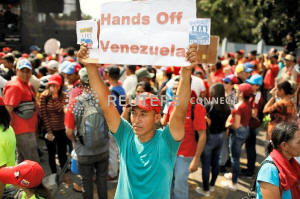|
Venezuela pressures foreign partners on
oil venture commitments: sources
 Send a link to a friend
Send a link to a friend
 [February 12, 2019]
By Marianna Parraga and Deisy Buitrago [February 12, 2019]
By Marianna Parraga and Deisy Buitrago
(Reuters) - Foreign partners of Venezuela's
PDVSA are facing pressure from the state-run oil firm to publicly
declare whether they will continue as minority stakeholders in Orinoco
Belt projects following U.S. sanctions, three people familiar with the
matter said.
The sanctions on Petroleos de Venezuela (PDVSA), imposed last month in
an attempt to dislodge Venezuelan President Nicolas Maduro, barred
access to U.S. financial networks and oil supplies for the PDVSA joint
ventures, pressuring Venezuela's already falling crude output and
exports.
PDVSA's Orinoco Belt joint venture partners, mostly U.S. or European
companies, are facing difficulties getting cashflow out of the country
as a result of the sanctions, straining their ability to continue
production and exports.
PDVSA has been in talks with the companies to persuade them to commit
publicly to the joint ventures, the sources said in recent days.

France's Total SA, Norway's Equinor ASA, Russia's Rosneft and U.S.-based
Chevron hold minority stakes in joint ventures with PDVSA that produce
crude and operate oil upgraders capable of converting Venezuela's
extra-heavy oil into exportable grades.
PDVSA did not reply to a request for comment. On Monday, Venezuelan Oil
Minister and PDVSA head Manuel Quevedo said on a visit to India that
relations with international oil companies including Chevron were
continuing.
A manager at Rosneft said last week that the company did not expect oil
output to decline at its projects in Venezuela this year, adding that
the company saw the current situation in Venezuela as temporary.
Rosneft did not respond to a request for comment on Tuesday.
The four crude upgraders are capable of converting up to 700,000 barrels
per day. The oil is exported by the joint ventures and each partner
receives its share of the exports.
Total believes it can stay in Venezuela, its Chief Executive Patrick
Pouyanne said on Monday, although last week the company said its bank
accounts were blocked and it had evacuated its foreign employees.
[to top of second column]
|

A supporter of Venezuela's President Nicolas Maduro holds a banner
during a rally in support of him in Urena, Venezuela, February 11,
2019. REUTERS/Marco Bello/File Photo

Rosneft has continued working normally at its Petromonagas joint
venture with PDVSA, according to the sources.
Equinor declined to comment on operational issues, referring
questions to Petrocedeno, its joint venture with PDVSA.
Chevron's operations in Venezuela are continuing, a spokesman said
on Monday, reiterating that the company was committed "to the
country's energy development in compliance with all applicable laws
and regulations."
Even if the companies commit to Venezuela, their ability to produce
could be crimped by the sanctions. Last week PDVSA ordered
Petrocedeno to halt oil production and upgrading, due to a lack of
naphtha to dilute the extra-heavy crude, according to sources from
the project.
The Petrocedeno-PDVSA venture's 220,000-bpd upgrader was already out
of service when the decision was made, one of the people said. It is
unclear when oil output will be halted.
PDVSA is studying if the other joint ventures in the Orinoco will
have to halt operations, with diluent supplies dwindling, the people
said.
India's Reliance and PDVSA's U.S. unit Citgo Petroleum are the main
suppliers of naphtha to Venezuela, according to internal PDVSA data.
Those flows have declined since sanctions took effect on Jan. 28,
according to Refinitiv Eikon data.
(Reporting by Marianna Parraga in Mexico City and Deisy Buitrago in
Caracas; additional reporting by Nerijus Adomaitis in Oslo, Olesya
Astakhova in Moscow; Editing by Rosalba O'Brien and Susan Fenton)
[© 2019 Thomson Reuters. All rights
reserved.]
Copyright 2019 Reuters. All rights reserved. This material may not be published,
broadcast, rewritten or redistributed.
Thompson Reuters is solely responsible for this content.
 |